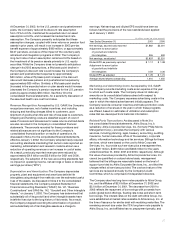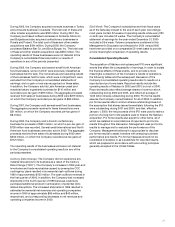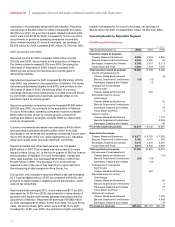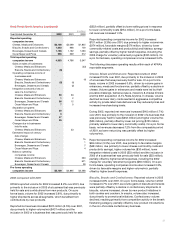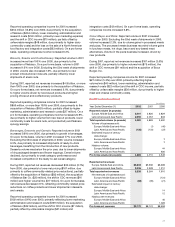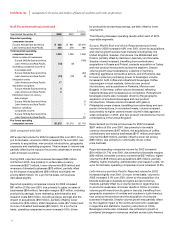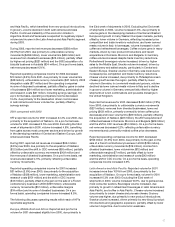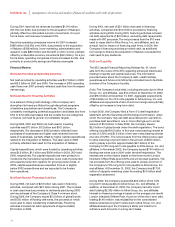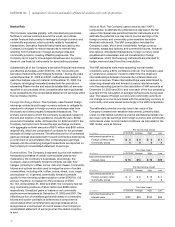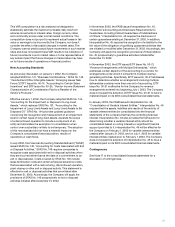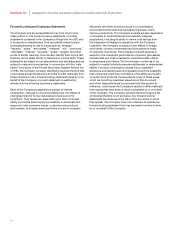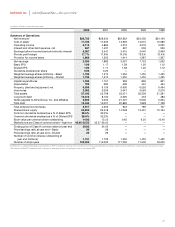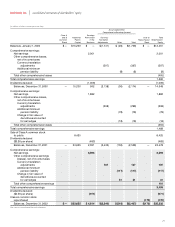Kraft 2002 Annual Report Download - page 41
Download and view the complete annual report
Please find page 41 of the 2002 Kraft annual report below. You can navigate through the pages in the report by either clicking on the pages listed below, or by using the keyword search tool below to find specific information within the annual report.
and Asia Pacific, which benefited from new product introductions.
In grocery, volume declined in both Latin America and Asia
Pacific. Continued instability of the economic climate in
Argentina, Brazil and Venezuela is expected to negatively impact
volume and income in the Latin America and Asia Pacific segment
during 2003.
During 2002, reported net revenues decreased $293 million
(12.6%) from 2001, due primarily to unfavorable currency
movements ($468 million), lower volume/mix ($58 million) and
revenues from divested businesses ($22 million), partially offset
by higher net pricing ($221 million) and the 2002 acquisition of a
biscuits business in Australia ($34 million). On a pro forma basis,
net revenues decreased 12.1%.
Reported operating companies income for 2002 decreased
$10 million (2.6%) from 2001, due primarily to lower volume/mix
($38 million), unfavorable currency movements ($37 million), 2002
integration costs ($17 million) and the operating companies
income of disposed businesses, partially offset by gains on sales
of businesses ($64 million) and lower marketing, administration
and research costs ($31 million, including synergy savings). On
a pro forma basis, operating companies income decreased
13.4%, due primarily to the devaluation driven cost increase
in Latin America and lower volume/mix, partially offset by
synergy savings.
2001 compared with 2000
KFI’s reported volume for 2001 increased 34.4% over 2000, due
primarily to the acquisition of Nabisco. On a pro forma basis,
volume for 2001 increased 3.5% over 2000. Excluding the 53rd
week of shipments in 2000, volume increased 4.8%, benefiting
from gains across most consumer sectors and driven by growth
in the developing markets of Central and Eastern Europe, Latin
America and Asia Pacific.
During 2001, reported net revenues increased $654 million
(8.6%) over 2000, due primarily to the acquisition of Nabisco
($1.2 billion) and the shift in CDC revenues ($26 million), partially
offset by unfavorable currency movements ($431 million) and
the revenues of divested businesses. On a pro forma basis, net
revenues decreased 4.5%, primarily reflecting unfavorable
currency movements.
Reported operating companies income for 2001 increased
$31 million (2.6%) over 2000, due primarily to the acquisition
of Nabisco ($128 million), lower marketing, administration and
research costs ($131 million) and the shift in CDC income
($13 million), partially offset by the gain on the sale of a French
confectionery business in 2000 ($139 million), unfavorable
currency movements ($51 million), unfavorable margins
($14 million) and income of divested businesses. On a pro
forma basis, operating companies income increased 8.5%.
The following discusses operating results within each of KFI’s
reportable segments.
Europe, Middle East and Africa: Reported and pro forma
volume for 2001 decreased slightly from 2000, due primarily to
the 53rd week of shipments in 2000. Excluding the 53rd week
of shipments in 2000, volume increased 1.3%, due primarily to
volume gains in the developing markets of Central and Eastern
Europe and growth in many Western European markets, partially
offset by lower volume in Germany, reflecting increased price
competition and trade inventory reductions, and lower canned
meats volume in Italy. In beverages, volume increased in both
coffee and refreshment beverages. Coffee volume grew in many
markets, driven by new product introductions and recent
acquisitions in Romania, Morocco and Bulgaria. In Germany,
coffee volume increased despite trade inventory reductions.
Refreshment beverages volume increased, driven by higher
sales to the Middle East. Snacks volume increased, driven by
confectionery and salted snacks, particularly in Central and
Eastern Europe. Snacks volume in Germany was lower due to
increased price competition and trade inventory reductions.
Cheese volume increased, due primarily to Philadelphia cream
cheese growth across the region, partially offset by lower
volume in Germany. In convenient meals and grocery, volume
declined as lower canned meats volume in Italy and a decline
in grocery volume in Germany were partially offset by higher
shipments of lunch combinations and pourable dressings in
the United Kingdom.
Reported net revenues for 2001 decreased $462 million (7.2%)
from 2000, due primarily to unfavorable currency movements
($231 million), revenues from divested businesses, lower net
pricing ($122 million, primarily commodity-driven coffee price
decreases) and lower volume/mix ($69 million), partially offset by
the acquisition of Nabisco ($46 million), the 2001 acquisitions of
coffee businesses in Romania, Morocco and Bulgaria ($28 million)
and the shift in CDC revenues ($14 million). On a pro forma basis,
net revenues decreased 6.2%, reflecting unfavorable currency
movements and commodity-related coffee price decreases.
Reported operating companies income for 2001 decreased
$158 million (15.5%) from 2000, due primarily to the gain on the
sale of a French confectionery business in 2000 ($139 million),
unfavorable currency movements ($19 million), income from
divested businesses, lower volume/mix ($12 million) and
unfavorable margins ($7 million), partially offset by lower
marketing, administration and research costs ($42 million)
and the shift in CDC income. On a pro forma basis, operating
companies income increased 0.5%.
Latin America and Asia Pacific: Reported volume for 2001
increased more than 100% from 2000, due primarily to the
acquisition of Nabisco. On a pro forma basis, volume for 2001
increased 10.3% over 2000. Excluding the 53rd week of
shipments in 2000, volume increased 10.6%, due to gains across
most consumer sectors. Beverages volume increased, due
primarily to growth in refreshment beverages in Latin America and
Asia Pacific, and coffee in Asia Pacific. Cheese volume increased,
due primarily to cream cheese and process cheese. Grocery
volume was higher, due primarily to new product introductions.
Snacks volume increased, driven primarily by new biscuit product
introductions and geographic expansion, partially offset by lower
volume in Argentina, due to economic weakness.
37


